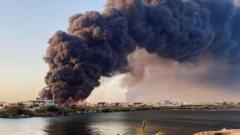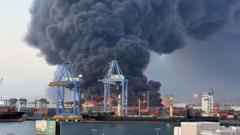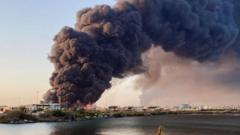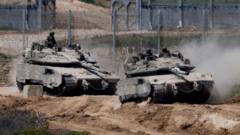Syria's Damascus International Airport is set to reopen next week as the new government tries to stabilize the war-torn nation after the ousting of President Bashar al-Assad. Despite efforts to impose order, clashes along the Lebanese border have raised concerns about escalating violence in the region.
Syria's Airport Reopening: A Sign of Stability Amid Tensions

Syria's Airport Reopening: A Sign of Stability Amid Tensions
Syria prepares to reopen its international airport in a bid for normalcy following 14 years of civil war, while border tensions with Lebanon linger.
Syria's main international airport in Damascus will operate again starting next week, marking a significant step for the newly established government in its pursuit of normalcy following the revolt that led to the removal of President Bashar al-Assad from power. Announced on Saturday, this reopening comes against a backdrop of rising tensions, particularly at the Syrian-Lebanese border, where recent clashes resulted in injuries to four Lebanese soldiers allegedly due to fire from Syrian militants.
Ahmad al-Shara, the de facto leader of Syria and head of the Islamist group Hayat Tahrir al-Sham that engineered the unexpected coup against al-Assad, faces the formidable task of restoring order in a nation fragmented by over a decade of civil war. Al-Shara is keen to project a moderate persona, engaging with Western officials and attempting to reassure both domestic and international stakeholders of Syria's commitment to stability.
In response to the border incidents, Lebanese Prime Minister Najib Mikati communicated with al-Shara, during which al-Shara assured that the Syrian authorities are undertaking all necessary measures to reestablish calm and prevent the recurrence of such clashes. Regional powers have been apprehensive about the potential for unchecked chaos following al-Assad's downfall.
Elsewhere in the country, Turkish-backed factions are embroiled in battles with Kurdish forces that have established an autonomous region in the north. Meanwhile, remnants loyal to al-Assad continue to present challenges, with government forces conducting operations to locate and neutralize these holdouts, particularly in the central city of Homs.
Israeli forces have escalated their military actions, targeting Syrian military sites and mobilizing troops into a previously demilitarized buffer zone, reflecting ongoing security concerns. Jordan has responded by restricting access at its crossings with Syria, further highlighting regional apprehension.
In parallel news, the situation continues to unfold in Gaza as Israeli military operations intensify. The Israeli Defense Forces are executing a prolonged ground operation, surrounding key institutions such as the Indonesian Hospital, which has been labeled by Israel as a Hamas stronghold. The humanitarian implications of this ongoing conflict raise further complexities within the regional dynamics.
As Syria undertakes these calculated steps towards reconstruction and increased oversight of security, the international community watches closely, mindful of the delicate balance between progress and potential unrest.





















